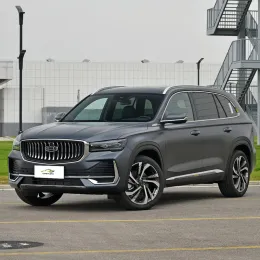What is the Best Fuel Economy for a Car?
Jun. 05, 2024
When it comes to choosing the best fuel economy for a car, the decision can be quite complex. The type of fuel your vehicle uses can significantly impact your overall driving experience, costs, and environmental footprint. While petrol, diesel, and CNG are the most commonly used fuels in India, there are several other options available that might offer better fuel economy depending on your needs and preferences. In this article, we will explore various fuel types and evaluate their fuel economy to help you determine which one is the best for your car.

Understanding Fuel Economy
Fuel economy refers to how efficiently a vehicle uses fuel, typically measured in kilometers per liter (km/l). Higher fuel economy means the car can travel further on a smaller amount of fuel, which translates to cost savings and reduced environmental impact. Factors influencing fuel economy include engine efficiency, vehicle weight, driving habits, and the type of fuel used.
Petrol (Gasoline)
Overview:Petrol is the most widely used fuel for cars due to its widespread availability and performance benefits. Petrol engines are known for their smooth operation and quick acceleration.
Fuel Economy:Petrol cars generally offer moderate fuel economy, with averages ranging from 12-15 km/l for city driving and up to 18-20 km/l on highways. Premium petrol can slightly improve performance and efficiency in high-compression engines.
Advantages:
Quick start and acceleration
Quiet engine operation
Widely available
Disadvantages:
Higher cost per liter compared to some other fuels
Lower fuel economy compared to diesel and CNG
Greater environmental impact due to higher CO2 emissions
Diesel
Overview:Diesel engines are known for their durability and high torque, making them suitable for both city and highway driving, as well as for heavy vehicles.
Fuel Economy:Diesel cars often achieve better fuel economy than petrol cars, typically ranging from 15-20 km/l in city driving and 20-25 km/l on highways. This makes diesel a cost-effective choice for long-distance driving.
Advantages:
Higher fuel efficiency
Better torque for heavy loads
Longer engine lifespan
Disadvantages:
Higher initial vehicle cost
More expensive maintenance
Diesel fuel can be less environmentally friendly than CNG or electric options
CNG (Compressed Natural Gas)
Overview:CNG is a cleaner alternative to petrol and diesel, known for its low emissions and cost-effectiveness. It is particularly popular in urban areas where air quality is a concern.
Fuel Economy:CNG vehicles offer good fuel economy, typically around 20-25 km/kg, making them an economical choice for city driving.
Advantages:
Lower fuel costs
Reduced emissions of harmful pollutants
Safe and stable fuel
Disadvantages:
Limited availability of refueling stations
Lower performance compared to petrol and diesel
See also:
Top 7 Problems With Electric Cars
When Should You Replace Your Heavy Duty Clutch for Optimal Performance?
How to Choose Audi TT MK1 Rear Coil Springs?
How to Replace Citroen C3 Coil Springs Easily
Understanding the Benefits of 10-Meter City Buses
Top Benefits of Using Genuine Truck Clutch for Optimal Performance
Choosing Wisely: How Car Air Filter Manufacturers Tackle Your Vehicle's Hidden Health RisksReduced trunk space due to CNG cylinder
LPG (Liquid Petroleum Gas)
Overview:LPG is another alternative fuel that offers a balance between cost and performance. It is less common than petrol, diesel, and CNG but is still used in various regions.
Fuel Economy:LPG provides a reasonable fuel economy, typically around 12-15 km/l, which is similar to petrol but at a lower cost per liter.
Advantages:
Lower cost per liter compared to petrol
Reduced engine wear and tear
Fewer emissions
Disadvantages:
Lower fuel efficiency compared to diesel and CNG
Safety concerns due to gas leakage risks
Limited suitability for heavy vehicles
Bio-diesel and Ethanol
Overview:Bio-diesel and ethanol are renewable fuels derived from organic materials. They are gaining popularity due to their lower environmental impact.
Fuel Economy:Bio-diesel and ethanol blends can offer decent fuel economy, but they are typically lower than that of conventional diesel. Bio-diesel averages around 15-20 km/l, while ethanol-blended petrol offers around 10-15 km/l.
Advantages:
Renewable and sustainable
Lower carbon emissions
Compatible with existing diesel and petrol engines
Disadvantages:
Lower fuel efficiency
Availability limited to specific regions
Potential engine wear over long-term use
Electric Vehicles (EVs)
Overview:Although not a fuel type, electric vehicles (EVs) deserve mention due to their exceptional energy efficiency and growing presence in the automotive market.
Fuel Economy:EVs offer the highest efficiency, typically measured in km/kWh. They can achieve around 100-150 km on a single charge, depending on the battery capacity and driving conditions.
Advantages:
Zero emissions
Lower running costs
Quiet and smooth operation
Disadvantages:
Higher initial purchase price
Limited range compared to fuel-powered vehicles
Charging infrastructure still developing
Conclusion
Choosing the best fuel economy for your car depends on various factors including your driving habits, vehicle type, and environmental considerations. Diesel and CNG offer high fuel efficiency and are cost-effective for long-distance and heavy-duty driving. Petrol provides good performance and is widely available, while LPG and bio-fuels present eco-friendly alternatives with moderate fuel efficiency. Electric vehicles stand out for their excellent efficiency and environmental benefits, though they come with their own set of challenges.
By understanding the strengths and weaknesses of each fuel type, you can make an informed decision that balances cost, performance, and environmental impact, ensuring the best fuel economy for your car.
Top Upgrades: 67 Chevelle Lowering Springs Guide
Is the GAC Aion V the Ultimate Solution for Urban EV Drivers?
Find Reliable Bosch Parts Distributor Near You
Essential Guide to Truck Water Pumps: Types and Selection
Essential Guide to Choosing a Concrete Mixer Truck
Find Your Perfect Cement Mixer Truck For Sale Today!
7 Key Features of the Shacman Logo You Should Know
766
0
0
None
None
Related Articles
-
337
0
0
-
348
0
0
-
440
0
0
-
Mastering Stability: Navigate Hyundai Suspension Steering Parts to Overcome Common Driving Struggles
367
0
0
-
390
0
0
-
368
0
0
-
83
0
0
-
95
0
0







Comments
All Comments (0)